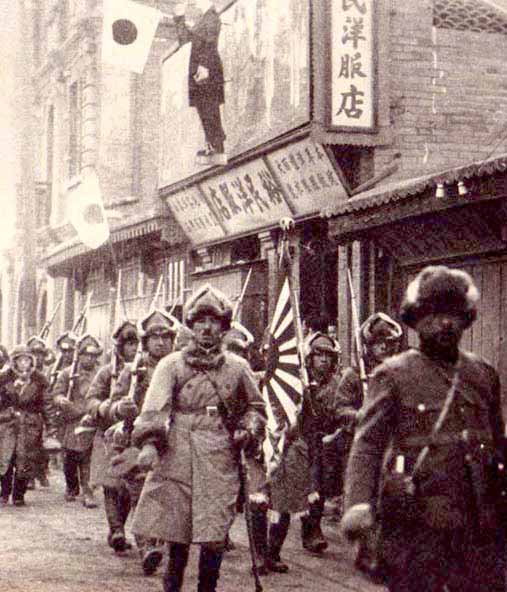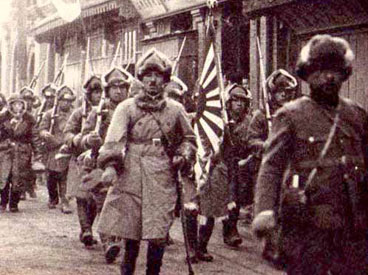
courtesy Wikimedia Commons
Eight years before the fighting began in Europe, Japan was already at war in China. In 1931, the Empire of Japan sent its army into the northern province of Manchuria. By 1937, it had set up a puppet government in the province and was moving south toward Beijing and then-capital city Nanjing.
People were surprised at the ferocity and audacity of Japan’s invasion. With one-sixth the population of China, did Japan really think it could conquer 450 million people and control over 4 million square miles? What did Japan’s rulers hope to accomplish?
One goal was the government’s need to consolidate its power. Tyrannical governments use war to unite their subjects and to extinguish any opposition. For years, the military rulers in Tokyo had taken advantage of the China campaign to appropriate Japan’s resources for the war effort and silence their political opponents in Tokyo.
Step into 1939 with a peek at these pages from The Saturday Evening Post 75 years ago:
The invasion’s other goal was to make all of Asia into a colony of Japan. The Imperial Japanese army had begun with China, the closest and richest prize. Decades of civil war and the lack of a central government had left China vulnerable. But Japan was looking at an enemy even bigger than China, according to Edgar Snow. A highly respected China expert, Snow was writing for the Post back in the 1930s, and in the September 2, 1939, issue, he laid out Japan’s ultimate goal: “the liquidation… of the international system of balance of power whereby Britain has, for many years, dominated most of the Orient.” (Read the entire article from the September 2, 1939 issue of The Saturday Evening Post here.)
Japan had been applying pressure on the British colonial power throughout the 1930s. In 1937, when Japan had captured the Chinese city of Tientsin, its troops avoided the British concession — an enclave of British subjects and businesses enjoying an unlimited lease of land within the city. However, the Japanese began a campaign of harassment.
“It was a matter of no great astonishment,” Snow wrote, “that the Japanese army virtually incarcerated the entire British population of Tientsin behind electrically charged barbed-wire barricades. Or that a strict blockade was imposed. Or that British subjects were submitted to indignity as a matter of routine, such as having their false teeth examined, or having passports stuffed down their throats. Or that the samurai undressed and exposed British women to the full view of a not very interested Chinese public, some of whom were paid ten cents a day to assemble and recite an anti-British litany.”
Meanwhile, “British ships are stopped, searched, and excluded from Chinese waters,” Snow continued, “at Japanese will. [Britain’s military attaché] for China, is seized and imprisoned, apparently to be held indefinitely by the Japanese army. … Japanese aviators, having machine-gunned one British ambassador out of China, amuse themselves by bombing the British Embassy in Chungking.”
Japan hoped to force Great Britain out of Asia and take over her colonies. This would have been even more ambitious than conquering China, if not for the help of Japan’s two allies, Germany and Italy. Together, the three Axis powers applied pressure on Great Britain, first on one hemisphere, then on the other.
In 1938, Hitler demanded the right to occupy the Sudetenland region of Czechoslovakia. When the British caved in to his demands, the Japanese were encouraged to make demands of their own. In the summer of 1939, the British government again bought their way out of war in Asia by agreeing, in effect, to recognize Japan’s occupation of China and not interfere in its conquest.
“This at least is clear,” concluded Snow. “Under the leverage of the Eurasian Axis, Britain’s outer ramparts of empire in China are rapidly collapsing. A narrowing margin of political maneuver is forcing upon British diplomacy a decision between two extremes … complete appeasement of Japan … or complete resistance.”
Reading Snow’s glum prediction, I’m impressed that Great Britain managed to avoid war in Asia for another two years.
Ultimately, even British maneuvering and negotiations couldn’t overcome Japanese audacity. In December 1941, Japan — still very much at war with China — declared war on Great Britain and attacked colonies in Malaya, Singapore, Burma, Borneo, and Hong Kong. And, apparently feeling two great nations weren’t enough of a challenge, the Japanese also declared war on the United States.
Become a Saturday Evening Post member and enjoy unlimited access. Subscribe now






